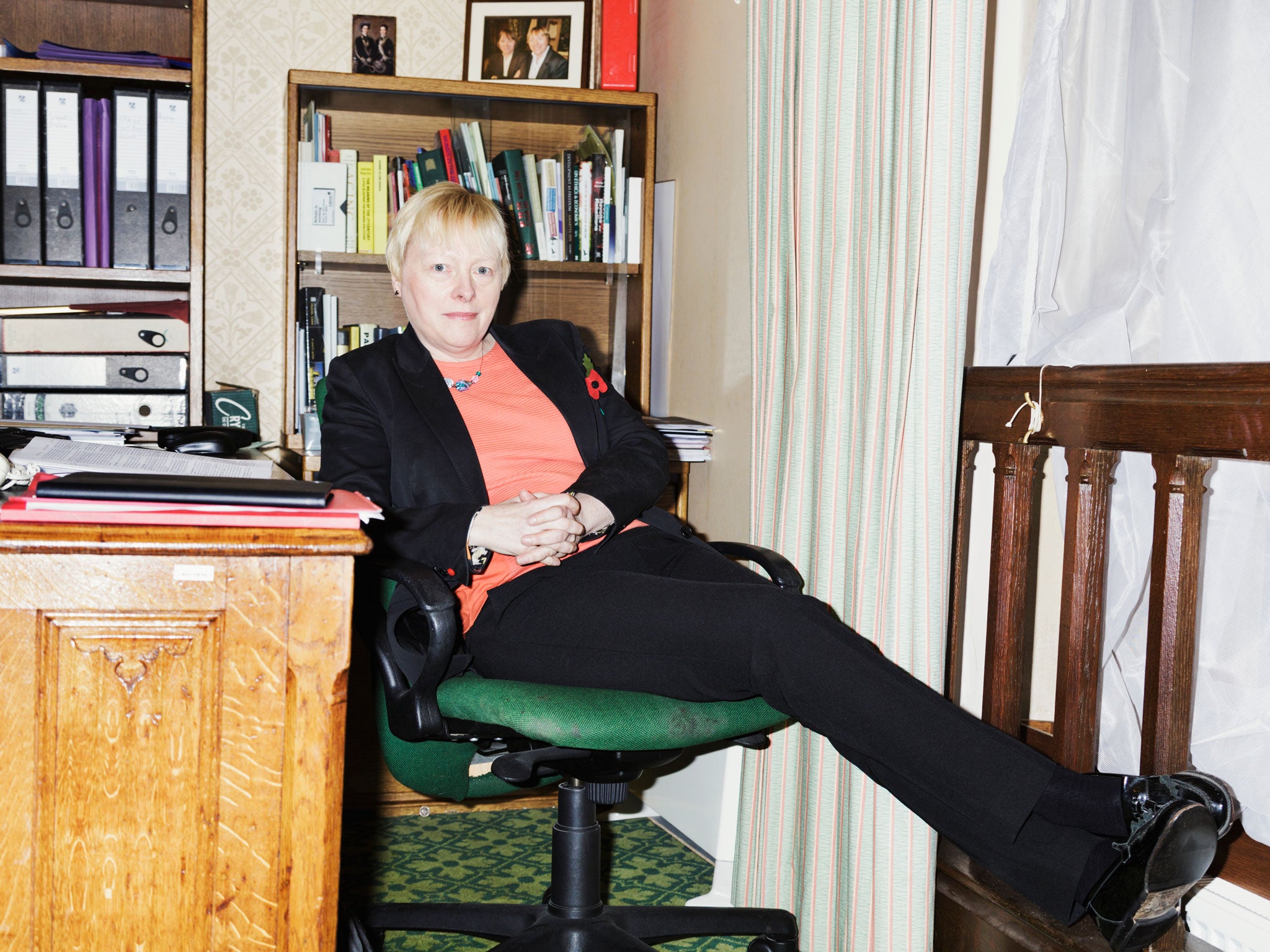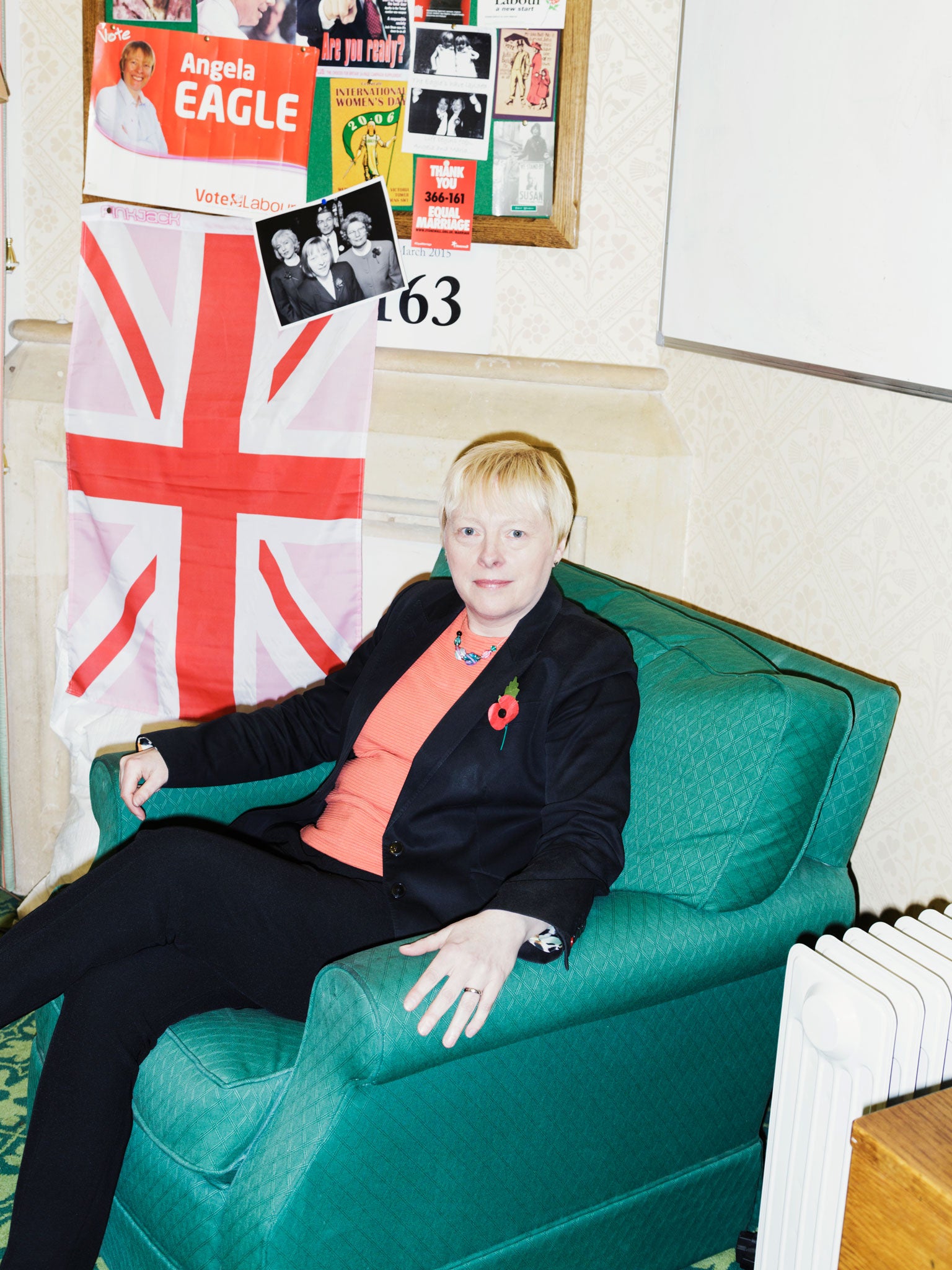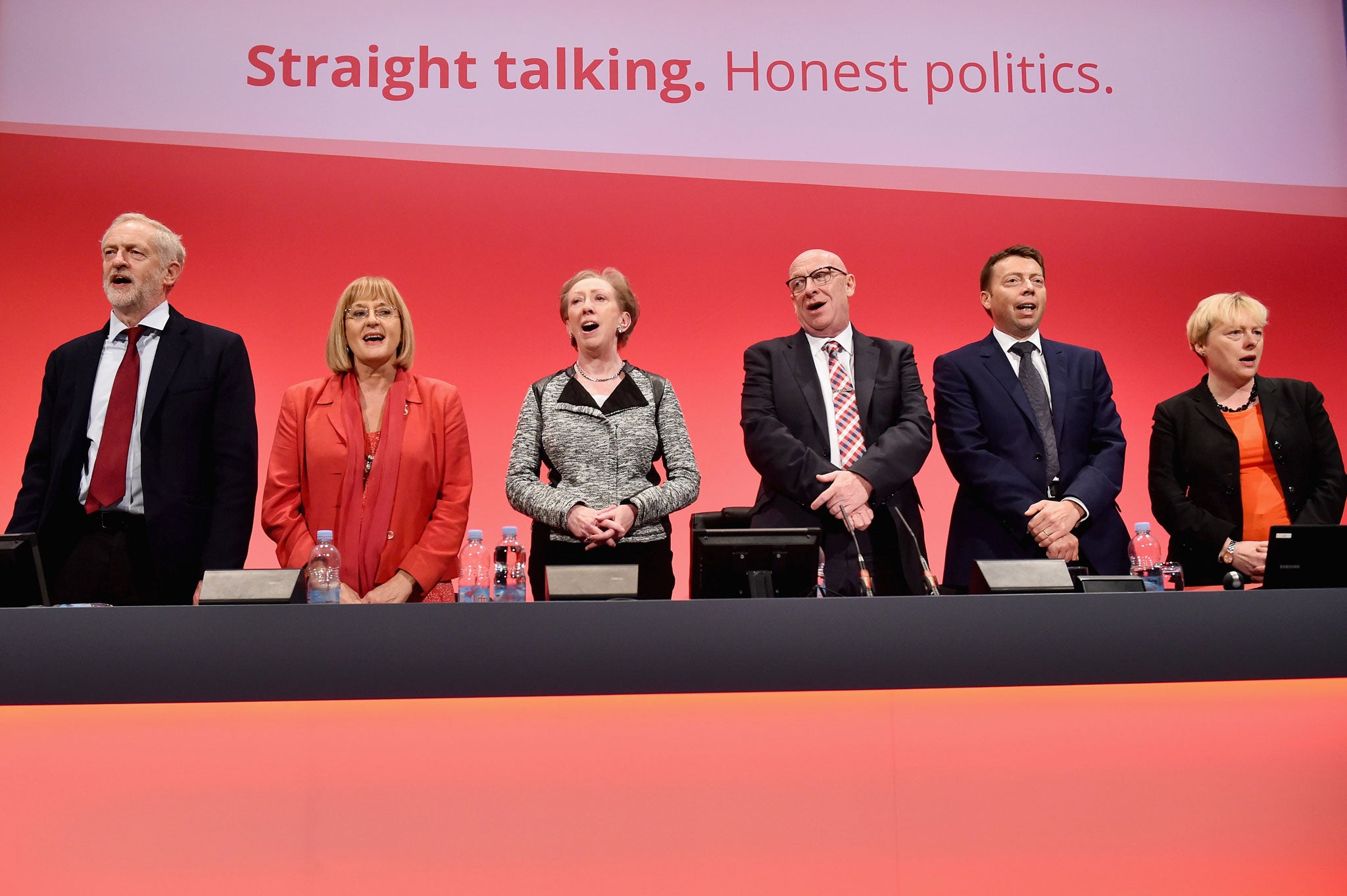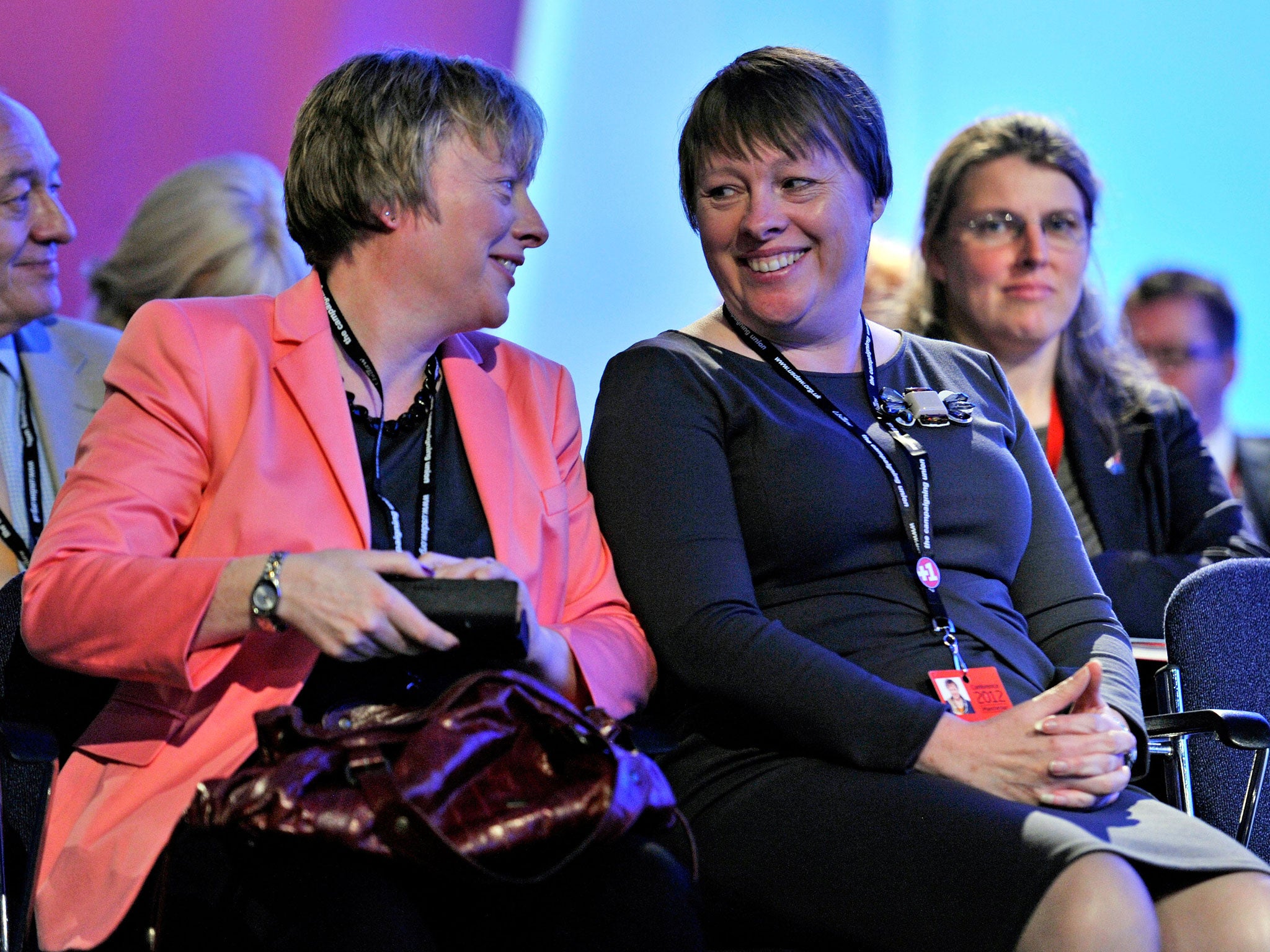Jeremy Corbyn’s top woman: Angela Eagle on a journey through Labour
Blair, Brown, Miliband, Corbyn: it’s been a tumultuous two decades for Labour, and Angela Eagle has had a ringside seat throughout. Geraldine Bedell hears her story

Your support helps us to tell the story
From reproductive rights to climate change to Big Tech, The Independent is on the ground when the story is developing. Whether it's investigating the financials of Elon Musk's pro-Trump PAC or producing our latest documentary, 'The A Word', which shines a light on the American women fighting for reproductive rights, we know how important it is to parse out the facts from the messaging.
At such a critical moment in US history, we need reporters on the ground. Your donation allows us to keep sending journalists to speak to both sides of the story.
The Independent is trusted by Americans across the entire political spectrum. And unlike many other quality news outlets, we choose not to lock Americans out of our reporting and analysis with paywalls. We believe quality journalism should be available to everyone, paid for by those who can afford it.
Your support makes all the difference.Angela Eagle is the invisible woman. We know remarkably little about her, even though, as Shadow First Secretary and Shadow Business Secretary, she is the most senior woman in the Labour Party, standing in for Jeremy Corbyn at Prime Minister's Questions. Insofar as she does have a public profile, it is for extraneous things: because she sits in the shadow cabinet with her twin sister (Maria Eagle, the MP for Garston and Halewood and the Shadow Defence Secretary); for being the first lesbian to enter a civil partnership while in Parliament; for being told by David Cameron to "calm down, dear!".This is an accidental sort of fame, for things that have happened to her rather than for things she has done or said.
She has not risen in the stellar way that might have been predicted when, at the age of 36, she was appointed the youngest minister in Tony Blair's first government. On the contrary, her boss appears promptly to have forgotten all about her. Damian McBride recalls in his memoirs that in the 2002 reshuffle "Tony forgot Home Office minister Angela Eagle existed, gave someone else her job and effectively sacked her from the Government by mistake – and without informing her."
Her current appointment as Shadow First Secretary was made many hours after she had been given the business brief and only after those around Jeremy Corbyn panicked at the flak they were taking about the lack of a woman in any of the four top jobs. The call did not come from Corbyn himself. Her status as Top Labour Woman appears to have been an afterthought.
So who is this person who, according to one of her friends, "has a brain the size of Everest," and appears to be respected in all wings of her rancorous party, yet who is barely known beyond the Westminster bubble? Why has she risen apparently without trace?
I meet her in her eyrie in a tower in the Palace of Westminster. Her office, with its faded Pugin wallpaper and fittings, has views across the Thames and downriver past the London Eye. If you go into the anteroom and look through a smaller window, you can see upriver as well. A small, neat figure, with a lightly mussed blond crop, Angela Eagle is dressed in black trousers and jacket, a coral-coloured top and some understated jewellery. It is a look put together with flair but unflashily.
She acknowledges straight away that lots of people haven't got the faintest idea who she is. This has been her choice.She has never had a press aide, for example. I expect her to defend this approach but, slightly surprisingly, she says that if she had her time again she might do things differently, that it's possible she got stuck in the past.
"Sometimes when you come in here you get formed by what it was like when you arrived. When I got here 23 years ago, we didn't have TV screens in our rooms and there was no 24-hour rolling news. What mattered was what you did in the chamber and how you then communicated that to the lobby, not the outside world. You get into habits."
She does, though, still manage to get some mileage out of her distance from the meretricious flim-flam of so much contemporary politics, with its rewards for "people who have a PR approach. I never wanted politics to be all about me, I wanted it to be about what I did and who I represented and what the results were." Which is all very well, but she has a different kind of responsibility now. Harriet Harman, who was previously the most senior woman in the Labour Party, led the fight for women's equality in an often bruisingly upfront fashion. Chuka Umunna, whom Eagle > succeeds as Shadow Business Secretary, is a natural communicator; someone who is media-savvy and arguably connects better with the wider public – and the CBI – than with his own party.
Angela Eagle steps into their shoes at a time when the Labour Party is in serious danger of being written off by the electorate as fundamentally interested only in itself, when many of its preoccupations look like the settling of old scores. If she is going to be effective, she will have to be a different kind of politician from the one she has been so far. She is going to have to address a wider public. "I don't mind," she says, "I can do it."

When you talk to people who know Angela Eagle, the phrase that keeps coming up is "values-driven". Her friends believe her conviction politics has its origins in her family history. She nods vigorously when I suggest this. Both of her parents came from Sheffield. Her mother passed the Eleven Plus and went to the grammar school, although her family couldn't afford the uniform and "she was constantly being ridiculed," so she gave it up in despair and left school altogether at the age of 15 to work in a biscuit factory. At the Labour Exchange, she said she wanted to work in an office but they said, "no, you're a factory girl."
"She died when she was 51, of cancer. At the time, she was in the second year of a degree at Liverpool John Moores University, finally doing what she should have been allowed to do if the system had been fair. My dad failed his Eleven Plus. He can still tell me some of the questions he didn't know the answers to, and he'll be 80 next year. It's a searing experience. He went to art school. He wanted to go to the Slade but again, it was something his family couldn't afford and didn't really understand and he had to leave and go into the print trade. I felt all that personally; it very much drove me."
Angela Eagle was born in February 1961, the first of the twins by 15 minutes. She is still not sure whether they are identical. "My mum always said not, but a lot of people think we are. We sound alike more than we look alike, I think. I once tried to have a conversation with my own answering machine when I thought she was there and had picked up the phone – so if I can mistake me…"
Someone who has worked with both sisters at Westminster says: "Angela is the nice twin. Maria is seriously scary. But they get on really well. They watch each other's backs. There's no briefing against each other by their offices, unlike with the Milibands."
Recent Labour history might suggest that it's a bad idea to go into politics with your sibling, but Angela Eagle dismisses any comparison. "I can't ever envisage in a month of Sundays falling out with my sister. She is my best confidante and friend and I am the same for her. We have lots of other friends, separately, but we understand each other before we've even said anything."
Perhaps it helps that they learned early what it means to be rivals. Their father taught them to play chess and they both competed nationally and internationally. "I think of it as kind of like the Williams sisters. Of course, we weren't on as big a stage as Wimbledon, but people thought it was funny to pit us against each other. We fought quite a lot of competitive chess matches. Rivalry has its place. But so does family."
Angela says she never let Maria forget who was the older twin when they were children. "I was unbearable. I made her go in the bottom bunk." She looks a little sad: "I would share, if I had my time again." Both girls went to Formby High School and then to Oxford to read PPE, although at different colleges. "We are different people and we have had different experiences. Maria was a lawyer," she says, adding with visible pride, "I don't believe, when she was practising, she ever lost a case."
The older twin was the first into parliament, having worked briefly for the CBI and for the then national health union COHSE. She became MP for Wallasey in 1992, where she remains a popular MP, bucking the national trend at the last election to double her majority to more than 16,000. Soon after her nomination, she had her first introduction to PR politics, a photo shoot on the ferry across the Mersey, where she says she learned to smile to order for photographs. The trick, she says, is to think of something that amuses you. "Roger Rabbit works for me."
Her old friend Lois Quam, an American Rhodes scholar at Oxford, who took over some of her work with the Labour Party in the City and who has known her since the mid 1980s, says she is a tremendously committed constituency MP. "She's really kind and compassionate. When she talks about her surgeries she speaks with great feeling. She is very focused on people. She thinks of the Labour Party as a force in the world. She values it for the role it can play in helping people recover from the losses in their lives."

Eagle describes herself as being on the soft left, a disposition she believes "doesn't exist much at the moment and needs to." But she has always been more pragmatic than factional. She recalls going to a meeting of Young Socialists in Crosby in 1978 and being shouted down for defending the minority Labour government. A Labour party in power, however insecurely, but not enforcing dogma was anathema to the Young Socialists, who were the beginnnings of what would become the Trotskyist Militant Tendency in Liverpool. "I remember coming out thinking 'I'm never going to go back there again.' And I didn't." > She took a similarly individualistic path at Oxford, joining the National Union of Labour Students but avoiding grandstanding student politics, in favour of getting involved more practically at consituency level. 'I was too interested in the real thing to do the pretend thing.'
Quam says: "She is not a factional person. Her commitment is to ideas. She is very creative, always open to innovative approaches in pursuit of progressive goals, to thinking about the perspectives of other people, especially those who aren't in leadership positions."
The ability to negotiate her way around what others see as insuperable divides appears to be Eagle's great strength, both politically and personally. "She has a lot of very loyal women friends who would do anything for her, right across different factions of the party," says one colleague.
John Prescott was fantastic when I came out. He said ‘Tell me something I don’t already know, love’
Dave Prentis, general secretary of Unison, the public services union that backed her campaign for the deputy leadership, says she brought unions and party together with unusual aplomb in the run-up to the general election, as chair of the policy forum.
"When we were discussing the manifesto, there was none of the negativity there had been in 2005 and 2010. She was able to bring the union general secretaries together – and they are a very idiosyncratic group – and get something the whole party could sign up to. It was a much better process than we'd ever seen before. She is principled, honest and she has fairness running through her blood. And that makes her widely respected."
In 1997, she came out as a lesbian. "I wanted to move in with my girlfriend [Maria Exall], now my civil partner. The only female MP who had come out before was Maureen Colquhoun and she lost her seat after being hounded by [the gossip columnist] Nigel Dempster. I went to talk to Chris Smith, who was out and in the cabinet. It's very difficult to get dinner with a cabinet minister when you're in government. I got all the way to coffee without telling him. I thought, 'I've got to! It's taken me months to get this!'
"It was difficult because I'm not the sort of person who steps out and says 'me, me!'" She spreads her arms wide. "But I told my boss, John Prescott, and he was fantastic. He said, 'tell me something I didn't know already, love,' and then, 'can I give you a hug?' I decided if it meant losing my seat, that was how it would be. And actually, when you make a decision like that, it's very liberating."

There is a view that anyone who has a job in the current Shadow Cabinet is wasting their time, because the party is more interested in itself than in addressing the issues confronting the country or engaging with the electorate. "Yes, we are internally-focused," Eagle acknowledges, "but we won't be forgiven if we don't address what is happening beyond us. I don't want a pure Labour Party that never gets elected. I want a Labour Party that can govern."
It may not be that easy. There is bitter talk on both left and right of the deselection of MPs who don't adhere to doctrine. "It's undoubtedly the case that those threats are being made in some places. Jeremy has said that's not the aim. I hope sense will prevail."
The party, she admits, is exhausted. A number of senior figures have spent the best part of a year campaigning: first for a general election that yielded an (initially) unexpected result; then over a long summer for the leader and deputy leadership. "Ed should have stayed on. The leadership election came far too early, before we'd even gone to bed and to sleep, let alone had a chance to think things through. After the election it would be ridiculous not to have a period of self-examination but now we're straight back into the first year of a majority Conservative Government and we have to keep trying to communicate with the electorate."
Eagle remains chair of the National Policy Forum, where she sees her job as partly about giving dissenting voices a hearing. "We need a lot less of the excitable betrayal narrative. We are a mature democracy and if we want to reflect the complexity of the changes that are happening around us, we have to have nuanced debate, based on ideas; ways of widening out the debate, with respect for each other's opinions. People have to think of party members as colleagues."
If the party is minded to take this course, her skills could come in very useful. She characterises her approach to chairing committees as "more feminine, more modern" than the "strong man model of leadership, which alienates quite a lot of women. The way I chair meetings is not about arriving at a series of fixes, it's about making sure that the appropriate people are called." She notes that when she chaired the EU Environment Council during the UK presidency, an impressive seven directives were agreed, "and everything was done and dusted by 5.30. Those meetings usually go through the night."
Angela Eagle may have risen to her current job unobtrusively but her skills are not to be underestimated. She smiles a lot, and the smile is twinkly, but there is a vigorous competence there. She becomes steely when she speaks about her belated promotion to Shadow First Secretary. "I don't see any responsibility I get given as an afterthought. It makes you second in the hierarchy in Government. I'm more than happy to do what that entails."
And she is nobody's poodle. When her new leader appeared at his first Prime Minister's Questions, reading out emails from various members of the public, a lipreader picked her up saying "we're going to be here a long time". The remark was funny and acute. She has an independence of mind that perhaps explains why it has suited her to get on with her job quietly, and others to give her difficult internal matters to sort out rather than call on her to sell policies to the country.
But she has never done a really big job before, either in government or opposition. Does she want to be out there in a way that now seems to be called for? One straw in the wind may be that she is a great Pretenders fan. "I think I wanted to be Chrissie Hynde." She used to go backstage at gigs and got to know Hynde. She will now have to display a little more of her friend's rock'n'roll flamboyance.It will not only be up to her. The party may not be in a mood for her inclusive approach. What if an increasingly inward-looking leadership comes up with some policy with which she profoundly disagrees?
"On the stump for the deputy leadership I said I would try to have my arguments with any leadership team behind the scenes. Politics is a collective endeavour, a team sport, and that depends on everybody doing their teamwork. My view is that the Labour Party is a vehicle to change things, so it's important that it remains vibrant, successful and in touch. Respect has to extend to everybody on the pitch. So I would approach any disagreement using the party's structures. But it would depend how profound it was. If the difference is that profound, you don't stay, do you?"
Join our commenting forum
Join thought-provoking conversations, follow other Independent readers and see their replies
Comments